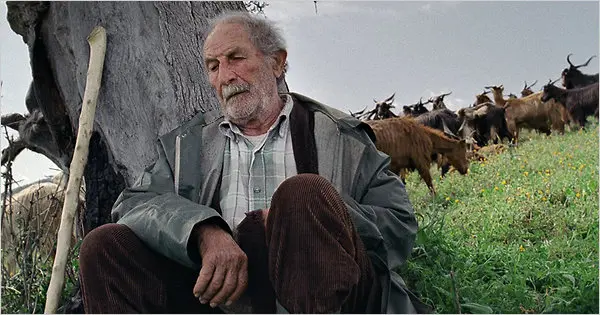 GIUSEPPE FUDA IN LE QUATTRO VOLTE
GIUSEPPE FUDA IN LE QUATTRO VOLTE
Pythagoras, transmigration, and Calabrian goatsFrammartino was born in Milan but again returns to his family's native Calabria, to which he had often traveled in his youth, for this second feature. He realized a dream: exploring the intersection of documentary and fiction, culture and history.
Le Quattro Volte is a formally beautiful, rather abstract, almost wordless visual poem. The filmmaker visited the Serre, a mountainous region of the Calabrian outback in the province of Vibo Valentia. He found there communities of shepherds and coalmen and decided to make a film, having found his elements but not yet determined how they would fit together. He made a film about an old goatherd, a baby goat, a big pine tree, and an ancient process of making charcoal, the four "volte" or "times" referred to in the title.
The intellectual framework of the film is more elaborate and high concept than that. For Frammartino it's important that Pythagoras lived in what is now Calabria in the 6th Century BC, and that his school taught the doctrine of the transmigration of souls. Pythagoras wrote: "Each of us has four lives inside us which fit into one another. Man is mineral because his skeleton is made of salt; man is also vegetable because his blood flows like sap; he is animal inasmuch as he is endowed with motility and knowledge of the outside world. Finally, man is human because he has the gifts of will and reason. Thus we must know ourselves four times."
Open-minded viewers may enjoy just watching the handsome photography of a little-seen part of the world, with medium and long shots of landscape and villagers, and closeups of goats, nimble, pretty, ometimes comical, the sense of a quiet, seemingly unspoiled land, not unlike the Aquila of Corbijn's recent
The American. On the other hand, notwithstanding the debt to Raymond Depardon and Robert Bresson, one may find
Le Quattro Volte's total absence of plot or dialogue, the preponderance of inarticulate, neutral framing, either offputting, or just boring.
We begin, anyway, with the Human. The Shepherd (Giuseppe Fuda) herds his goats up in the hills and slopes above his village. He is ill, with a chronic cough. To treat it every night he drinks dust gathered from the floor of the local church mixed with water. Dirt not being an effective remedy for respiratory disease, the Shepherd dies: dust to dust. But in a striking shot from inside the marble tomb, there is still a heartbeat as it is sealed. The film moves immediately to the animal world, as a white baby goat is seen dropping from his standing mother's womb and slowly scrambling to his feet (an arresting sequence by any standard). Eventually a number of baby goats head out of the village following the herd up into the surrounding hills, but the little white one gets stuck in a long trench and becomes isolated. Eventually it runs up a slope and finds refuge under a big fir tree. From the Human we have moved to the Animal and now Plants take center stage.
Next, villagers are seen coming and cutting down the tall tree. Frammartino has explained that this is part of a local custom called Pita. They strip the tree, set it upright in the center of the village, and someone rides it over onto the street. A very long and typically static shot by excellent cinematographer Andrea Locatelli with his 35mm camera stationed high above a street shows men in costumes with the tree, a dog comically chasing back and forth around them and later causing a small truck to slip down a hill and bash down a fence. What the ceremony means is not explained, but we see Good Friday celebrations, with villagers recreating the Stations of the Cross, suggesting Resurrection.
Later the fir tree's cut into pieces and taken out of town to where the coalmen build wooden domes in which the wood is fired and turned into light, crispy black charcoal. Thus Human has gone to Animal, thence to Plant, now to Mineral. No dialogue, no music through all this, only the sounds of daily life, the tinkling of goat bells, roar of small engines.
As Jay Weissberg points out in his
Variety review of this film, it's quite manipulative, making use of three villages to represent one, never showing signs of the presence of modern life -- pop music, television, cell phones. Things found in the remotest human habitations today are edited out to give a sense of primitivism and quietude. If this is truth, it's truth of a highly predetermined and honed-down kind. Due to the film's highly experimental nature its US box office potential may be dubious; but then Philip Gröning's nearly wordless 2005 monastery documentary
Into Great Silence had a good US art house run.
Le Quattro Volte's festival success is indicated by its winning the Europa Cinemas Label for Best European Film in the Directors’ Fortnight at Cannes, and it received glowing reviews in Italy and went on to Telluride and Toronto, as well as the NYFF. US theatrical release will begin at Film Forum in NYC in March 2011. According to IMDb, it opened on eighteen screens in Italy March 28.
Seen as part of the New York Film Festival at Lincoln Center in September 2010, this 88-minute Italian-German-Swiss coproduction is a Lorber Films release from Kino Lorber Inc. in the US.





